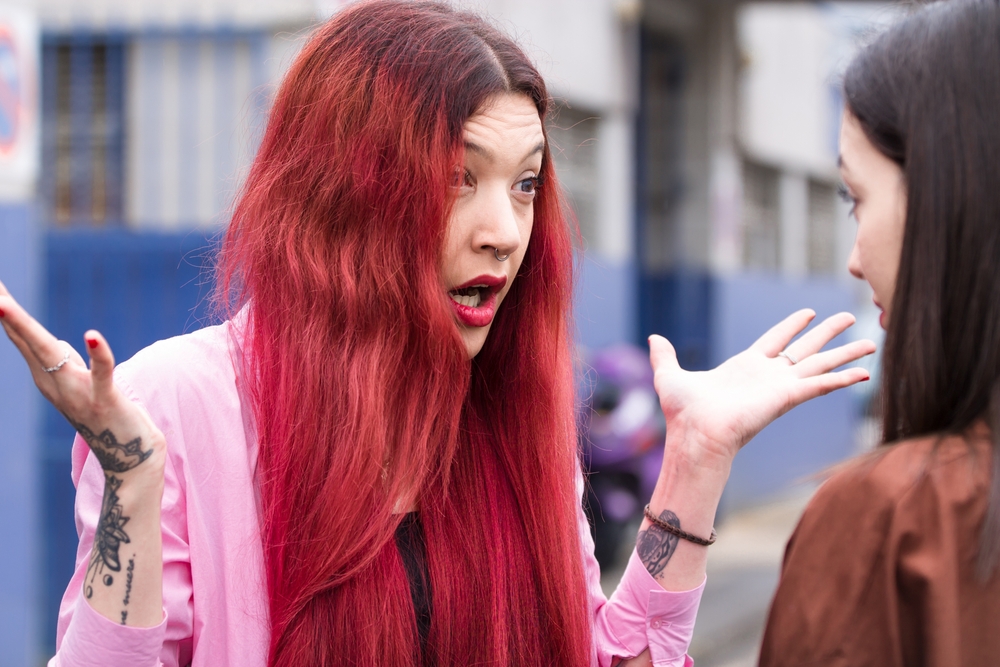Nobody likes to think they’re the “toxic” one, but let’s face it—sometimes we all need to take a hard look in the mirror. Toxicity doesn’t always come in loud, obvious forms, more often than not, it sneaks in quietly through subtle habits or patterns we don’t even notice. If you’re wondering if you might be that friend, here are the small but telling signs to watch for. Recognizing them is the first step toward being a better one.
1. You’re Always the One Talking

Ever notice that conversations with your friends tend to revolve around you? If you rarely ask about their lives—or quickly steer the subject back to your own—you might be unintentionally dominating the friendship. Sure, everyone loves a good story, but friendships are about give and take. If your friend always leaves feeling unheard, it’s time to flip the script and genuinely show interest in their world. Listening is an underrated superpower.
2. You Downplay Their Achievements

If you find yourself brushing off your friend’s wins—whether it’s a promotion, a personal goal, or even something small like sticking starting a new hobby—you might be the toxic friend that everyone tolerates. Jealousy or insecurity might be driving this, but it leaves your friend feeling unsupported. Celebrating their victories, no matter how big or small, shows you’re genuinely happy for them. Anything less can make you look petty.
3. You Make Jokes at Their Expense

A little teasing between friends can be harmless, but if your jokes always seem to come at their expense, it might be crossing a line. Poking fun at their quirks or decisions might get a laugh here and there, but over time, it chips away at their confidence. If you notice them laughing less or brushing off your comments with a forced smile, it’s worth rethinking your humor. No one wants a friend who constantly makes them the punchline.
4. You Always “One-Up” Their Stories

Your friend shares a vacation story, and you immediately jump in with your “even better” trip. They talk about a tough week, and you remind them yours was harder. If this sounds familiar, you might be one-upping without even realizing that you’re doing it. While it’s natural to relate through shared experiences, constantly topping their stories can make them feel unheard or diminished. Sometimes, the best response is to just let them have their moment.
5. You Expect Them to Always Be Available

Do you get annoyed when your friend doesn’t answer your calls or texts right away? If you expect them to drop everything for you but don’t offer the same in return, it’s a red flag. Friendships thrive on mutual respect, not demands. Life gets busy, and healthy friendships understand that. If you find yourself frustrated by their boundaries, it’s worth reflecting on whether your expectations are fair—or a little too one-sided.
6. You Vent Without Asking If They Have the Capacity

Sometimes, you just need to unload, but if you’re constantly treating your friend like a therapist, it might be taking a toll on them. Before diving into your next rant or sharing some pretty heavy emotions, try asking if they have the bandwidth to listen. Your problems are valid, but so is their need for space. Friendships aren’t dumping grounds—they’re places for mutual support. A simple “Do you have time to hear me out?” goes a long way in showing respect.
7. You’re Competitive About Everything

From fitness goals to work milestones, if you treat every aspect of your friendship like a competition, it can create unnecessary tension. Healthy friendships aren’t about keeping score with one another, they’re about lifting each other up. If you’re constantly trying to outshine them, you’re probably exhausting them. Take a step back and remind yourself that their success isn’t your failure—it’s a win for your team.
8. You Struggle to Apologize

When was the last time you apologized and you actually meant it? If you can’t remember—or if you tend to throw out half-hearted “I’m sorry if you felt that way” statements—you might be letting pride get in the way. Friends make mistakes, that’s normal. What matters is owning up to them when they happen. A sincere apology shows you value the friendship more than your ego. Without it, resentment has a way of creeping in.
9. You Don’t Respect Their Boundaries

If you roll your eyes when your friend says they can’t hang out or need space, you might be crossing a line. Ignoring or dismissing their boundaries sends the message that your needs are more important than theirs. Friendships thrive on mutual respect, and respecting boundaries is a huge part of that. Take a step back and remember that boundaries aren’t rejection—they’re how your friend stays healthy and balanced.
10. You Rarely Follow Through

Do you find yourself canceling plans last minute or forgetting commitments? If so, it might be time to assess how reliable you are as a friend. Flaking every now and then happens, but a pattern of no-shows or broken promises chips away at trust. Your friend needs to feel like they can count on you. If that’s not happening, it’s worth asking why—and making changes before the friendship wears thin.
11. You Gossip About Them Behind Their Back

Everyone vents now and then, but if you’re frequently sharing your friend’s personal business with others, it’s a major breach of trust. Even if it feels harmless, gossip erodes the foundation of a friendship. Ask yourself: would they feel betrayed if they knew what you were saying? If the answer is yes, it’s time to zip it. Being a safe space for your friend means keeping their confidence, no matter what.
12. You Hold Grudges Instead of Communicating  provided by Shutterstock
provided by Shutterstock
If something your friend did bothered you, do you address it, or do you silently stew and let resentment build? Holding grudges instead of having honest conversations creates tension and distance. While confrontation can be uncomfortable, it’s better than letting unspoken issues fester. Healthy friendships thrive on open communication, even when it’s hard. Letting things slide might seem easier in the moment, but it only makes things worse in the long run.
13. You Struggle to Be Happy for Them

If you find yourself feeling jealous or bitter instead of happy when your friend has good news, it’s time for some self-reflection. Your reaction says more about your insecurities than it does about them. A good friend celebrates their wins, even when life isn’t going your way. If you can’t do that, the friendship can start to feel lopsided and tense. Recognize those feelings and work on showing genuine support.
14. You Rarely Make Them a Priority

Are you the friend who always says, “Let’s catch up soon!” but never follows through? If you’re constantly too busy to make time for them, it sends the message that they’re not a priority. Friendships need effort to survive, and neglect can feel like rejection. If you value the friendship, prove it by carving out time to connect. Even small gestures—like a quick check-in—show you care and keep the relationship strong.
15. You Don’t Appreciate Them Until They’re Gone

If you only realize how much your friend means to you after they’ve pulled away, you might be taking them for granted. Relationships don’t flourish on autopilot—they require consistent effort and appreciation. Waiting until they’re distant or hurt to show you care is a recipe for regret. Start noticing the little things they do now and let them know how much they matter before it’s too late.
This content was created by a real person with the assistance of AI.
